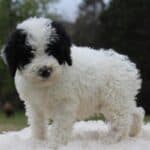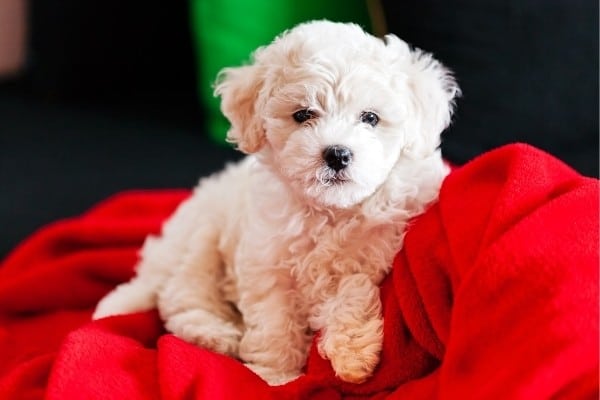
Mixed breeds will display traits, both physical and behavioral, from both parent breeds.
While some inherited traits may be strongly evident, others may be seen to a lesser degree, having been “softened” by the other parent breed’s influence.
So, before we look at some of the most popular Bichon Frise mixes, let’s first quickly examine the Bichon Frise’s most notable characteristics.
Bichon Frise Facts
History
Although much of the Bichon Frise’s history has been lost to time, many believe the breed can trace its roots back to the Barbichon Tenerife of the Canary Islands.
Due to the breed’s fancy looks, these dogs were favored by European aristocrats in their early days.
Narrowly surviving the French Revolution and both World Wars, the breed made a steady comeback and gained full recognition from the American Kennel Club in 1972.
Size
Both males and female Bichon Frises should be between 9 and 12 inches tall when measured from the floor to the highest point of the shoulder.
The expected weight of an adult Bichon is between 12 and 18 pounds, with females typically found on the lower end of the weight range.
Colors
The majority of Bichon Frises are pure white, but other varieties are accepted by the American Kennel Club.
Bichon Frise may also be white and apricot, white and cream, and white and buff with the secondary color usually appearing most heavily on the ears but may occur elsewhere on the body.
The secondary color shouldn’t cover more than 10% of the coat, according to breed standards.
Temperament
The Bichon Frise is an animated, cheerful, smart little dog with a huge personality.
This gentle breed is quite people oriented, friendly, playful, and confident, and they don’t mind resorting to silly antics in order to be in the spotlight.
When raised correctly, they’ll do well with both children and household pets.
Known for being a sensitive breed, they are often incredibly attune to your mood and will take great offense if treated harshly, so only positive, reward-based training methods should be used.
Exercise Requirements
Bichon Frises are not intensely energetic and typically only need about 30 minutes of exercise each day.
Backyard playtime definitely counts, but many Bichons love walking and will happily keep up with you on long walks and even hikes.
Puppies, however, should not be encouraged to exercise vigorously as this can cause permanent damage to their still-developing body.
Grooming
Daily brushing of the coat and the teeth is recommended.
A pin brush and comb (like this double-sided fine/coarse comb) are needed for daily use, and a slicker brush should be used to straighten and fluff the hair when blow drying after a bath.
Every four weeks or so, the nails should be clipped, the ears cleaned, and the coat trimmed.
While these jobs can be done at home, most owners opt for a visit to a professional groomer.
Health
Bichon Frises are typically hearty dogs with relatively few major health issues encountered in life.
However, genetics play a leading role in determining the future health of a puppy.
A responsible breeder will ensure all breeding dogs have been evaluated and deemed clear of health issues known to affect the breed, such as:
- Dental problems, including overcrowding, gingivitis, improper bite, and early tooth loss.
- Allergies.
- Patellar luxation.
- Legg-Calve-Perthes disease.
- Hip dysplasia.
- Hyperadrenocorticism.
- Eye conditions, like cataracts, glaucoma, and tear staining.
- Kidney and urinary tract issues.
- Hypothyroidism.
- Issues with cortisol levels, including Cushing’s and Addison’s disease.
- Cancer.
Do Bichons Bark a Lot?
With a well-trained, properly socialized Bichon who is frequently in the presence of his family, nuisance barking should not be an issue.
However, a Bichon who is left alone for long periods of time may develop a bad barking habit due to boredom and/or loneliness.
Is a Bichon Frise a Good Family Dog?
Characterized by an affectionate, pleasant, cheerful nature, a Bichon Frise is an excellent choice for families.
They typically are gentle and loving with children as long as they are treated in a like manner.
Bichon Frises grow very attached to their family, love to play, and are quite fond of snuggling.
This charming breed is eager to please and loves being the center of attention, so they usually catch on to learning new tricks easily.
What Problems Do Bichon Frise Have?
Bichon Frises have a reputation for being notoriously difficult to housebreak. However, typically a lack of diligence and consistency from the owners is to blame.
Many owners often complain about this breed’s nuisance barking; however, here again, the fault usually is the owner’s.
Separation anxiety can be a problem as Bichon Frises adore being in the company of people and often do not do well being left alone for long periods.
Breed Highlights
| Origin | Most likely the Canary Islands |
| Height | 9 – 12 inches at the withers |
| Weight | 12 – 18 pounds |
| Colors | Most commonly pure white |
| Temperament | Cheerful, eager to please, playful, loving, demands attention |
| Exercise needs | Fairly low |
| Grooming requirements | High |
| Health | Joint, eye, hormonal, and urinary issues possible as well as allergies, dental trouble, and cancer |
| Life expectancy | 14 – 15 years |
Mixed Breed Dogs
Do not expect a mixed-breed dog to be identical to either parent breed, because this is rarely the case.
Most mixed breeds will inherit a delightful combination of traits from both parents, and traits common to both parents are often enhanced.
This could be positive, as in the case of two low-shedding breeds, or negative, as would be the case with behavior issues, such as stubbornness or aggression.
What to Expect With a Bichon Mix
Because of the variety of genes at play when combining two breeds, predicting physical and behavioral traits isn’t always accurate.
However, with a Bichon Frise mix, many of the Bichon Frise’s desirable traits are often inherited, particularly if the other parent has a similar temperament and physical features.
Generally, expect a Bichon Mix to be friendly, affectionate, playful, low shedding, and moderately energetic.
Why Are Some Mixed Breeds So Expensive?
The demand for a particular mix is typically the driving force behind high prices.
Positive traits, such as hypoallergenic tendencies, low shedding, and a cheerful, easy-going disposition, are highly sought after, and many breeders will capitalize on this.
Are Mixed Breed Dogs Healthier?
It’s commonly believed that mixed breeds have what is called hybrid vigor, defined as the tendency to be free from major health issues and healthier overall than both parents.
Though its validity is highly debated in certain circles, hybrid vigor is likely the result of the larger, more diverse gene pool available when combining different breeds.
Mixed Breed Pros
For reasons not thoroughly understood, many mixed breeds tend to inherit the best, most desirable traits from each parent while the negative traits often disappear or are at least diminished.
The variety possible, such as color and size, when combining two breeds is another advantage as is the decreased likelihood of inherited diseases.
Mixed Breed Cons
There’s always some uncertainty as to whether desired traits will come through in a mixed-breed puppy.
Thus, mixed breeds are rather unpredictable as far as traits are concerned.
Also, if the two parent breeds are predisposed to the same health issues, a puppy could wind up with numerous inherited disorders.
Bichon Frise Mix Puppy Care
Like all puppies, a Bichon Frise mix will need lots of love, near-constant supervision, regular veterinary care, and a nutrient-dense diet.
Early training and socialization are critical to raising a well-adjusted, confident, obedient companion.
Becoming accustomed to routine grooming chores, baths, the noise of clippers, etc. at a young age is important for a dog who has a lifetime of being subjected to grooming ahead of him.
Adorable Bichon Frise Mixes
Bichon Frise and Poodle = Poochon
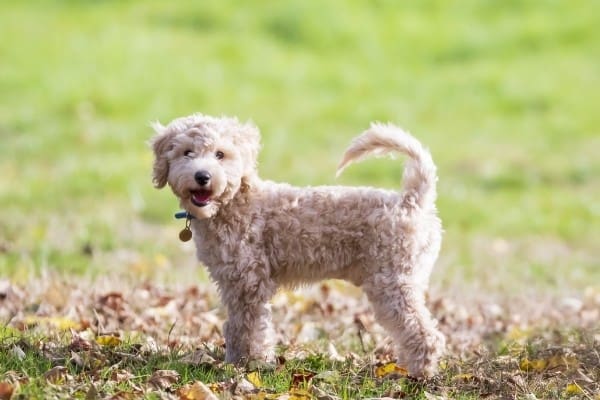
Also known as: Bichonpoo, Bichon Poodle Cross, Bichpoo, Bichon Frise Poodle Mix
Poochon Temperament
The delightful Poochon is a friendly, affectionate, playful dog who, like the parents, loves attention and will go to great lengths to obtain it.
Highly sociable, the Poochon thrives on companionship and will get along with all family members and fellow canines alike.
Poochon Average Size
Most Poochons will be approximately 10 inches tall when measured to the withers and will weigh between 8 and 15 pounds at adulthood.
Size can vary but will be largely dependent on the size of both parents.
If a Miniature Poodle is used for breeding the height may be closer to 15 inches and weights up to 18 pounds are possible.
Poochon Colors
While Bichon Frises are almost always pure white, Poodles come in many colors, so the variety possible in Poochons is impressive.
White, apricot, cream, or tan Poochon puppies are common, but any of the Poodle colors are possible.
It all depends on the color of the Poodle used.
Poochon Exercise Needs
A Poochon is likely to be more energetic than his Bichon parent and thus will need between 30 and 45 minutes of exercise daily.
Some Poochons who take heavily after their Poodle side for energy levels may need an hour or more of walking and active playtime.
Poochon Trainability
Thanks to their Poodle parent, most Poochons are very intelligent and easy to train.
Basic obedience as well as special tricks can be learned quickly as long as training sessions are engaging and involve plenty of positive reinforcements.
Proper socialization (see our Complete Guide), of course, is a must.
Poochon Grooming Requirements
Because both parent breeds are considered to be very low shedding and hypoallergenic, expect the same in the Poochon.
However, a thorough brushing at least every other day is mandatory, unless the coat is clipped very short.
Ears and teeth will need routine cleaning, and every month or so, the nails and coat should be clipped.
Poochon Average Price
Poochon prices can vary significantly with a range between $500 and $3,000, sometimes more.
The average price is typically around $2,500.
Price is typically dependent on demand, health screenings performed, breeder expertise, and the puppy’s color.
Bichon Frise and Maltese = Maltichon
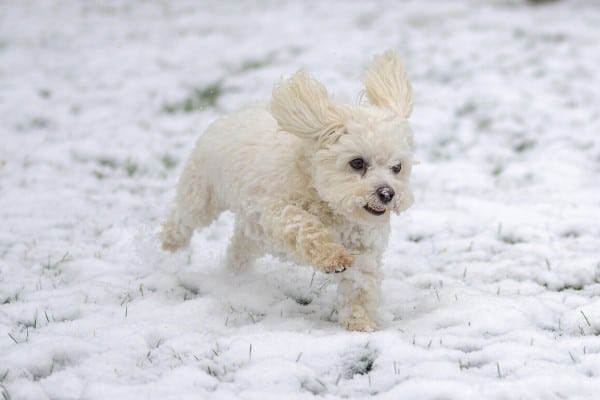
Also known as: Maltese Frise, Bichon Maltese Cross
Maltichon Temperament
Maltichons are affectionate, loyal, and alert little dogs who much prefer being with their family than spending time alone.
Separation anxiety may be a problem, and if they take after their Maltese side, stubbornness may be seen too.
They generally get along well with children and household pets, but care must be taken to prevent injuries.
Most enjoy being held, and snuggling is often a favorite pastime.
Maltichon Average Size
Maltichons are small dogs with a height ranging from 7 to 10 inches at the withers and a weight between 7 and 14 pounds on average.
Females are often on the smaller end of the size range and often appear more dainty and delicate.
Maltichon Colors
The vast majority of Maltichons will be solid white, like the parent breeds.
However, occasionally the white coloring will be paired with a secondary color to form a bicolored coat.
The additional color may be lemon, cream, apricot, buff, or tan, depending on which color the parents carry.
Maltichon Exercise Needs
The Maltichon is not considered to be an overly active dog and typically only needs 30 minutes or so of exercise daily to stay fit.
A few short walks or active playtimes are usually sufficient. The rest of his energy will be exhausted through free play and following family members around the house.
Maltichon Trainability
The ease of training a Maltichon largely depends from which side of the family tree he inherits his temperament.
Bichons are relatively easy to train, but Maltese can be a bit stubborn and even manipulative at times.
Consistency, rewards, and determination will be the key to successful training.
Maltichon Grooming Requirements
Whether the coat is long and silky like a Maltese, curly and fluffy like a Bichon Frise, or somewhere in between, brushing at least every other day will be needed as will a trip to the groomer every four to six weeks.
Any tear stains will need daily care, and dental hygiene shouldn’t be neglected.
The ears should be cleaned every other week, and the nails will need a trim once a month.
Maltichon Average Price
The adorable Maltichon is certainly popular, but breeders are scarce.
When you do find an available puppy, or more likely an open waitlist, be prepared to pay between $1,500 and $3,000.
Avoid any prices that are too good to be true as the puppies are likely the product of a puppy mill.
Bichon Frise and Shih Tzu = Shichon
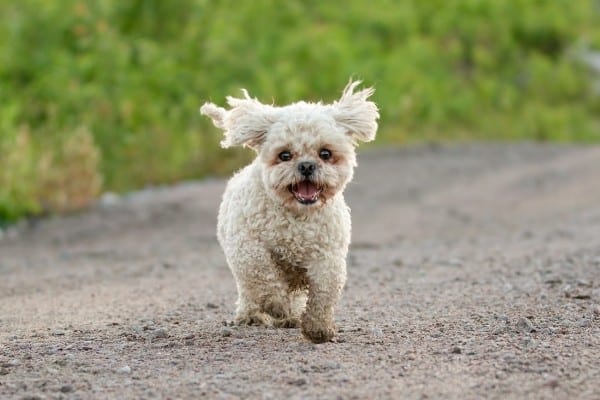
Also known as: Zuchon, Shih Tzu Bichon Mix, Shih Tzu Frise
Shichon Temperament
In addition to being downright precious, Shichons are generally sweet, affectionate, friendly, and amusing.
These charming dogs love to cuddle and be with their owners as much as possible, sometimes to the point of being clingy.
They may have issues with nipping if not trained early and correctly, but they’re typically gentle and loving to all family members and even do well with other pets.
Shichon Average Size
Most Shichons will be roughly 10 inches tall at the withers and weigh between 10 and 15 pounds when fully grown.
Shichon puppies complete much of their growth in the first nine months of life, though they may continue to fill out until they reach their first birthday.
Shichon Colors
Thanks to the Shih Tzu’s contribution to the mix, Shichons can come in a wide variety of colors, including, black, blue, brindle, gold, liver, red, and silver.
Solid white is another possibility, or the white coloring can be paired with another color or colors to produce bicolored and tricolor dogs.
Shichon Exercise Needs
Shichons are lively and energetic, but they don’t need hours of daily exercise either.
Generally, 30 to 45 minutes of exercise each day is sufficient.
The physical activity could be in the form of brisk walks and/or playing games either outside or indoors.
Shichon Trainability
Although definitely intelligent, some Shichons may be a bit of a challenge to train, both for obedience and housebreaking, especially if the dog tends to behave more like a Shih Tzu than a Bichon Frise.
Shih Tzus can be a little bossy yet sensitive as well.
The best approach to training a Shichon is to be firm but not harsh and to offer plenty of praise and a reward the instant the desired results are noted.
Shichon Grooming Requirements
Daily brushing down to the skin is needed to prevent mats, and most owners opt for a bimonthly professional clip.
Teeth cleaning should be done several times each week, and ears should be cleaned every other week. Nails typically need trimming once per month.
Shichon Average Price
Like many other popular Bichon Frise mixes, Shichons are typically priced between $1,000 and $3,000.
Both parent breeds are usually fairly expensive, so pricing in these ranges is not surprising.
Beware of Shichons offered at very low prices as they may be the product of a puppy mill or an inexperienced breeder who doesn’t follow good breeding practices.
Bichon Frise and Pomeranian = Pomachon

Also known as: Pom Frise, Bichonaranian, Pomeranian Bichon Mix, Bichon-A-Ranian
Pomachon Temperament
Pomachons can be expected to be affection, devoted, lively pets who are extremely people oriented.
These spirited mixes are generally gentle but may be nippy during play or when feeling threatened, especially if they strongly take after their Pomeranian parent.
Stubbornness, excessive barking, and separation anxiety may be problematic, particularly if early training is neglected.
Pomachon Average Size
The Pomachon isn’t a large dog by any means.
The average Pomachon will stand 7 to 10 inches tall at the highest point of the shoulder and weigh between 6 and 15 pounds when fully grown.
Because they’re so small, care must be taken to ensure they are not stepped on by people or injured by larger animals.
Pomachon Colors
The Pomeranian brings many color options to this cute mixed breed.
In addition to being white like the Bichon Frise parent, a Pomachon can be black, blue, chocolate, cream, orange, blue merle, cream sable, red, or tricolored, just to name a few possibilities.
Pomachon Exercise Needs
The Pomachon typically needs 30 to 45 minutes of active play or walking daily.
Some more energetic Pomachons may need more than an hour of exercise to exhaust their energy levels.
Brisk walks, structured games like fetch, and free play with safe toys are ideal options for exercise.
Pomachon Trainability
Pomachons are quite intelligent and can train easily with the proper methods.
However, inexperienced owners may have difficulty with housebreaking and struggle with issues, such as stubbornness and indifference.
Patience and consistency paired with lots of positive reinforcements are the secret to training successfully.
Pomachon Grooming Requirements
In addition to the normal dog-maintenance tasks of ear cleaning, nail clipping, and teeth brushing, Pomachons will need to be thoroughly brushed down to the skin several times per week.
Pomachons with Bichon-type hair will need daily brushing.
Most owners find that a trip to the groomer once every six weeks cuts down on at-home grooming tremendously.
Pomachon Average Price
The Bichon Frise Pomeranian mix is not widely available, so be prepared to be placed on a waitlist for an upcoming litter.
Pomachon prices usually fall within the $1,000 to $2,500 range, though some may be more than $3,000 or as little as a couple of hundred dollars, depending on the current demand and the breeder.
Is a Bichon Frise Mix Right for Me?
A Bichon Frise mix will most likely require heavy grooming to prevent tangles and mats and to prevent skin issues from developing.
Training and socialization will be essential to prevent bad or undesirable behaviors, such as excessive barking, aggression, and small-dog syndrome.
If you don’t mind the unpredictability of a mixed breed and are totally committed to providing a dog with the care and training needed, then a Bichon Frise mix can be the perfect choice for a loving, devoted, and entertaining lifelong companion.
Related Question:
Is a Bichon Frise Mix a Designer Dog?
Designer dogs are the result of intentionally mixing two or more separate breeds with the hopes of achieving or enhancing certain traits, such as a low-shedding coat.
In this regard, a Bichon Frise mix who was purposely bred for the niche market (not the result of a female secretly visiting the neighbor’s dog) is considered to be a designer dog.
Last update on 2024-04-17 at 17:55 / Affiliate links / Images from Amazon Product Advertising API







